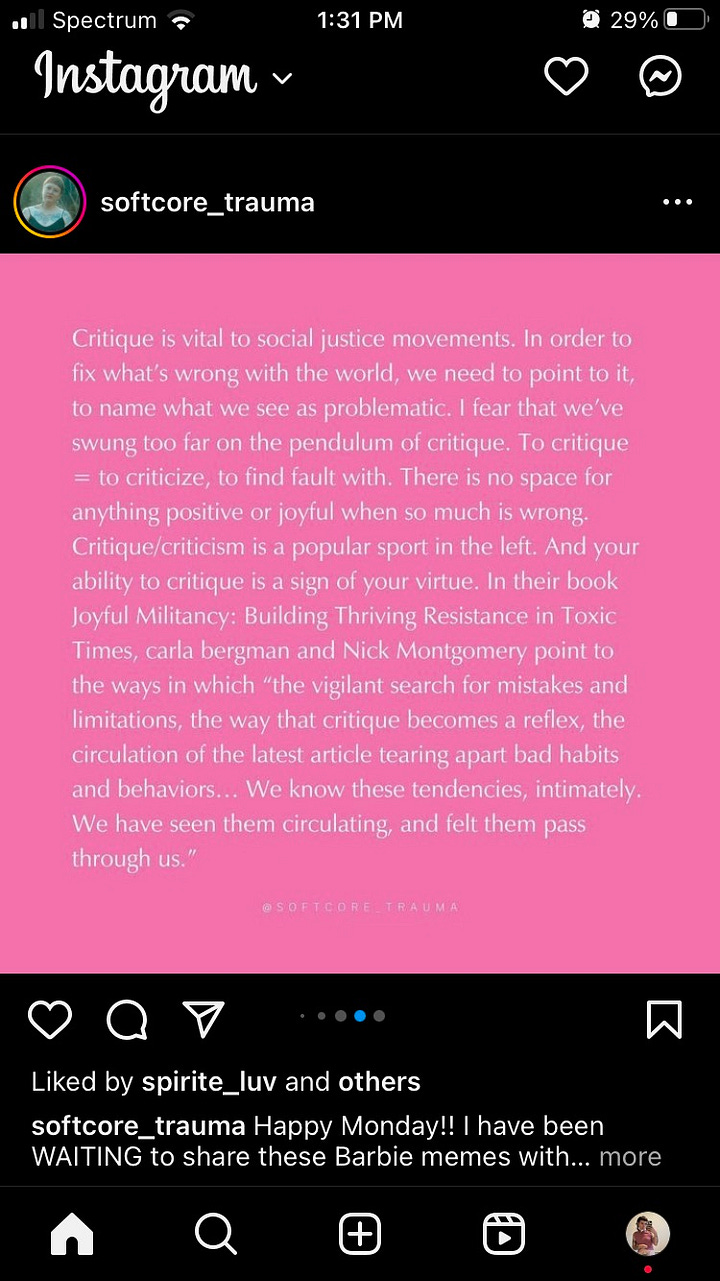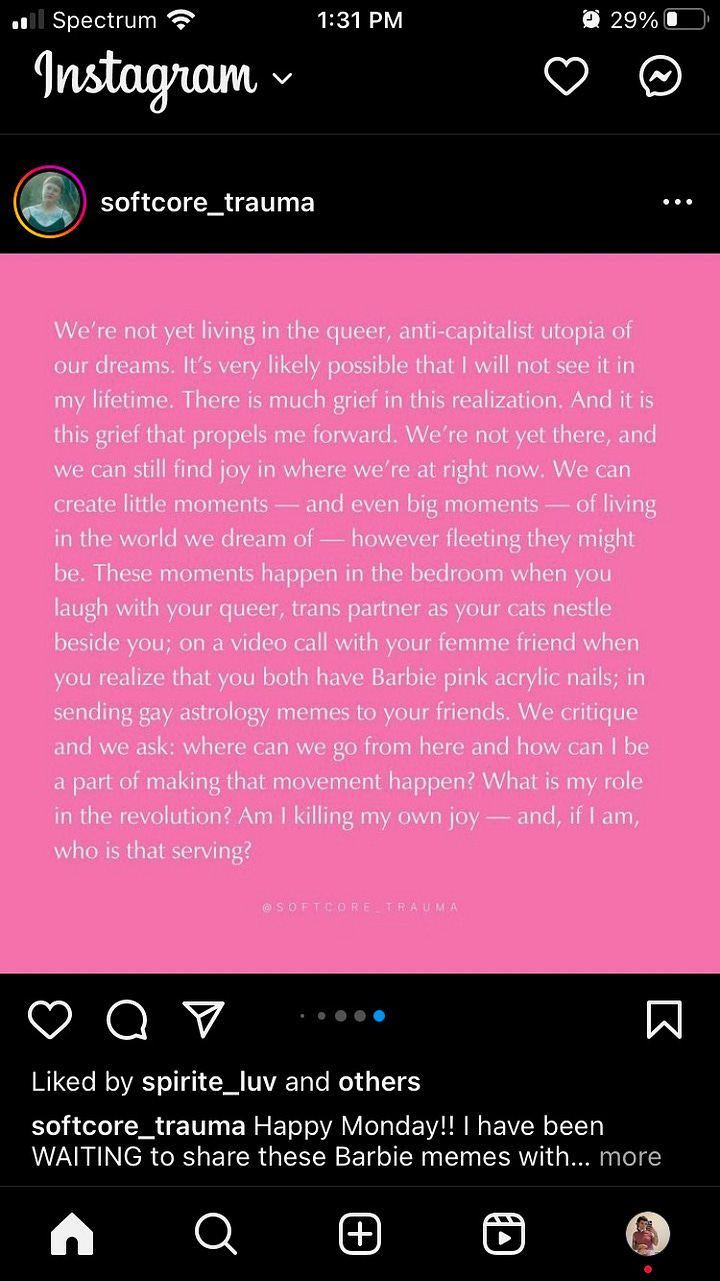I haven’t seen Barbie. I probably won’t. Certainly I won’t see it in a theater. It looks pretty bad, and everything I’ve read from people I’m inclined to trust supports this opinion. As does everything positive I’ve read about it tbh.
I’d like to discuss some “discourses”1 around Barbie. My first run-in with non-paid internet boosters of this movie was in the comment section of a post on an anti-consumerism subreddit. The post was essentially just bemoaning the fact that some people are ready to accuse any criticism of Barbie of being misogynistic, since men’s rights activists have been taking the truly unhinged positions that Barbie is anti-male propaganda and that Margot Robbie is “mid.”
The comments under this post were almost exclusively self-exculpating whataboutism. Instead of saying “yes, of course, this mass media advertisement for a misogynistic toy is troubling on many levels, and also…” or “the spectacle of consumption that accompanies the film is detestable, but…”, many of the commenters made arguments like the following:
I hope I don’t have to explain how disingenuous and needlessly defensive these are. What this kind of reaction elucidates is 1) how ingeniously the Barbie movie producers have positioned their product and 2) how susceptible people are to motivated reasoning and binary thinking. The evil genius of Barbie is how thoroughly trapped the adult target audience is.
On the one hand, Barbie’s director, Greta Gerwig, is a darling of “indie” cinema. The target audience loves her, and she is strongly associated with a kind of milquetoast girlboss white feminism. She’s got a real talent for her craft, and she has the power to draw huge numbers to a film like this, even among people who would be disinclined to see a faux-feminist blockbuster toy commercial otherwise. Additionally, we have borne witness in recent years to a strong pro-femme movement online, one that sees femininity and femme creativity as positive good.2
On the other hand, we have the MRAs who crave power over women and cannot, under any circumstances, see liberated femininity as a good thing. The target audience observes the situation and comes to the defense of Barbie. It is, after all, “for” them, and the people they despise, the fashy anti-feminist louts, are against both the movie and women. It’s a no-brainer.
Here, I want to set aside the nuances of one’s personal choices.3 I don’t want to make argument for or against seeing Barbie. In the conversations I’ve had irl with people about this movie, people who intend to buy a ticket, their choice to see it seems to come down to, as one friend put it, the “pleasurable phenomenological experience” of seeing the film in theaters. Understandable. And who, even me, can resist the temptation to engage in discourse, a practice which is far easier (and more fun)4 when you’ve seen the thing you’re discussing.
Instead, I want to probe the kind of reasoning we see in the screenshots above and below, the latter from instagram user softcore_trauma in a post which excerpts a two paragraphs of a substack post they’ve written (full quote below).


Critique is vital to social justice movements. In order to fix what's wrong with the world, we need to point to it, to name what we see as problematic. I fear that we've swung too far on the pendulum of critique. To critique = to criticize, to find fault with. There is no space for anything positive or joyful when so much is wrong. Critique/criticism is a popular sport in the left. And your ability to critique is a sign of your virtue. In their book Joyful Militancy: Building Thriving Resistance in Toxic Times, carla bergman and Nick Montgomery point to the ways in which "the vigilant search for mistakes and limitations, the way that critique becomes a reflex, the circulation of the latest article tearing apart bad habits and behaviors... We know these tendencies, intimately. We have seen them circulating, and felt them pass through us.”
We're not yet living in the queer, anti-capitalist utopia of our dreams. It's very likely possible that I will not see it in my lifetime. There is much grief in this realization. And it is this grief that propels me forward. We're not yet there, and we can still find joy in where we're at right now. We can create little moments - and even big moments - of living in the world we dream of - however fleeting they might be. These moments happen in the bedroom when you laugh with your queer, trans partner as your cats nestle beside you; on a video call with your femme friend when you realize that you both have Barbie pink acrylic nails; in sending gay astrology memes to your friends. We critique and we ask: where can we go from here and how can I be a part of making that movement happen? What is my role in the revolution? Am I killing my own joy - and, if I am, who is that serving?
I could (and have, on instagram) take some pot shots at this response. I mean, defensive much? & are we really going to start accusing people of virtue signalling because they hate Barbie (2023)? But these jabs are so easy to make because they’ve been made before, at big budget movie fans mad that people think their all-time favorite movies about dudes with names like “Starlord” are actually not the greatest films cinema has to offer, but are, instead, reactionary trash designed to sell stuff. softcore_trauma gives the game away in their substack post: “I sat and read the critiques of Barbie from folks on the left, I couldn’t help but find myself thinking ‘Oh no, it’s wrong for me to like this film. My enjoyment is problematic.’” All of this metadiscourse is really about hurt feelings.
I find this kind of sophistry just embarrassing to read. We’re seeing in real time the capitalist recuperation of feminist and anti-capitalist critique and people like this are practically crying tears of joy in the theater.5 And they have the gall to log in and tell the rest of us that we’re too obsessed with ideological purity. What a fragile thing your queer/feminine joy must be if it is dependent on massive international entertainment conglomerates and toy companies. I don’t relate. I can’t think of a more cynical recent film than the Barbie movie, and I can hardly think of something more expressly bad faith than a “left” defense that argues we are critiquing Hollywood blockbusters too much.
I’ll end on a little bit of speculation: The cohort of millennials who had their socialist awakenings in college are genuinely exhausted with losing. You can see it in the instagram post above. An uncompromising socialist ethos would suggest that you must keep critiquing the culture. You must keep holding your fellows to a higher standard. You must remain aware of the imperial structure of our world and act accordingly. You must resist the recuperation of your messaging and ideals and struggle mightily to build the world you want. You have to think hard about what you do for work, how you spend your money, and how you treat the people around you every day. And you must continue this project until you die, whether or not you make any headway. For some people, these demands are too much. They strain the psyche.
So when some people sit down to watch Barbie, what they really really don’t want is for it to be yet another sign of how far we need to go. They want it to be a sign of “progress,” not a commodity produced and starring millionaires that exists to make billionaires richer. Instead of just enjoying the film on its merits and thoughtfully considering the criticisms, they must purify themselves. They must concoct a logic in which their enjoyment is actually not a way of participating in a mode of cultural production they ought to despise. Instead, enjoying Barbie is, to them, a radical act of defiance in a world that makes them feel bad. That’s pathetic.
Diffuse internet discussions are frequently, if often jokingly, referred to with phrases such as “the discourse,” but this language often reflects a gullible overconfidence about how far-ranging and representative one’s own discursive sphere actually is, considering that it is almost always largely centered around one or two niche communities representing a fraction of the userbase of a specific social media website
& we love to see it.
To be clear, I think you can make some really principled arguments for strategically refusing to consume products like this. However, everyone has a different set of ideas regarding when it is appropriate to “vote with your dollars” (a toothless strategy regardless). Still, you’d think the sheer wastefulness and corporate aggrandizement would leave a bad taste in your mouth with this one, not to mention the way the film sells feminist critique to profit male execs and shareholders. I guess that’s contemporary mainstream feminism in a nutshell though.
Perhaps in the future we can circle back around to the subject of “discourse as pastime.” I’ve just ordered a book on the Enlightenment in France, which should provide some interesting material to think against.
"To see Sasha, the tween daughter of Gloria (America Ferrera’s character) tell Barbie how harmful her image has been to young girls and women, while also dropping in words like “facsist,” “sexualized capitalism,” and “rampant consumerism” had me weeping inside for how much the world has changed since I was that age. I had NO language for understanding why I felt so fucked up. I cannot understate how huge I think this is. How necessary.” (from the aforementioned substack post)





